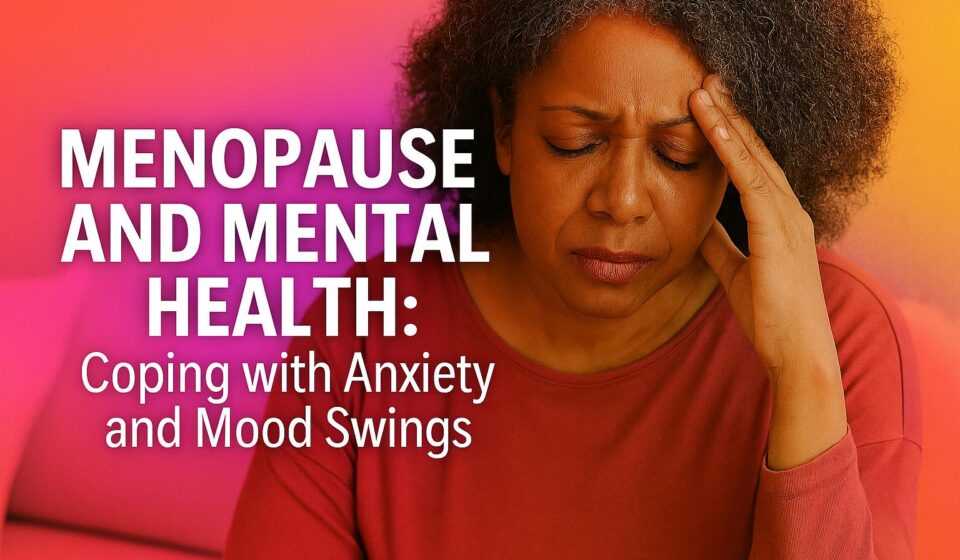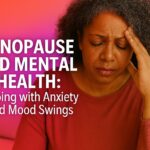
Menopause and Mental Health: Coping Anxiety and Mood Swings
Menopause and Mental Health: Coping with Anxiety and Mood Swings
Menopause is more than just a physical transition — it’s an emotional and psychological journey that many women are unprepared for. While hot flashes, night sweats, and irregular periods often dominate conversations, the mental health effects of menopause remain under-discussed. At Mothering Global, we believe it’s time to bring those conversations into the light.
Table Of Content
- Menopause and Mental Health: Coping with Anxiety and Mood Swings
- Why Mood & Anxiety Often Rise During Menopause
- Hormonal Fluctuations & Neurochemistry
- Elevated Risk of Depression or Mood Disorders
- The Sleep–Mood Link
- Life Stressors & Psychological Load
- 1. Talk About It — Share, Normalise, Seek Support
- Why Talking Helps
- How to Start
- 2. Move Your Body — Exercise & Activity as Medicine
- The Science Behind It
- Practical Suggestions
- 3. Eat for Your Brain — Nutrition That Supports Mood
- Key Nutritional Strategies
- Dietary Patterns That Work
- 4. Prioritise Sleep — Restore Your Foundation
- Common Sleep Issues in Menopause
- Strategies to Improve Sleep
- 5. Consider Therapy or Medication — When to Get Professional Help
- Therapy Options
- Medication & Hormonal Treatments
- 6. Practice Mindfulness & Emotional Self-Care
- Techniques & Practices
- Evidence & Benefits
- Putting It All Together: A Holistic Plan
- Key Takeaways & Encouragement
In this post, we’ll explore how menopause can affect mood and anxiety, what research says, and concrete strategies you can use (or share) to find balance and well-being. You’re not alone — and there is help.
Why Mood & Anxiety Often Rise During Menopause
Before diving into coping strategies, it helps to understand why many women experience increased anxiety, irritability, or mood swings during this phase.
Hormonal Fluctuations & Neurochemistry
- Estrogen affects neurotransmitters such as serotonin, GABA, and dopamine, which regulate mood and anxiety. When estrogen levels fall or become erratic, some women become more vulnerable to depression and anxiety.
- In perimenopause (the transitional phase before the final menstrual period), menstrual hormone fluctuations are stronger and less predictable, which amplifies mood instability. About 4 in 10 women report mood symptoms reminiscent of PMS, but occurring irregularly and more persistently.
Elevated Risk of Depression or Mood Disorders
- Several longitudinal studies show that the risk of high depressive symptoms increases during the menopausal transition (i.e. perimenopause) and may persist into postmenopause.
- One analysis of over 9,000 women showed that perimenopause was the stage associated with the highest risk of depression. ScienceDirect
The Sleep–Mood Link
- Sleep disruption is common among women undergoing menopause: estimates suggest up to 60% may suffer insomnia or poor sleep quality. PMC+1
- Poor sleep is itself a strong predictor of mood disturbances, cognitive decline, irritability, and fatigue. In one longitudinal cognitive study, sleep quality was the major predictor of declines in verbal learning and memory across menopause. Lippincott Journals
- Hot flashes and night sweats often interfere with restorative sleep, and interestingly, some studies have found that anxiety and depression mediate (i.e. act as intermediaries) in the relationship between hot flashes and sleep quality. One study found that anxiety accounted for 17.9% of the mediating effect and depression ~5.4%. BioMed Central
Life Stressors & Psychological Load
- The change in life during the 40s–50s (career pressures, caring for children or aging parents, identity shifts) often coincides with menopause. These external stresses can combine with hormonal vulnerability to exacerbate mood symptoms. ACOG+1
- A recent study also suggests that perceived stress, resilience, and self-efficacy influence how severely women experience depression, anxiety, or memory complaints during menopausal stages. Frontiers
Given all that, we see how menopause can be a “perfect storm” for mental health challenges — hormonal shifts + sleep disruption + life pressures.
1. Talk About It — Share, Normalise, Seek Support
Why Talking Helps
- Reduces isolation: Many women feel ashamed or confused when their emotional changes are brushed aside. Simply voicing what you’re going through can be validating.
- Reframes perceptions: When you realise others are going through similar challenges, the symptoms feel less like personal failings and more like part of a shared transition.
- Enables timely help: Sharing with friends, family, or health professionals opens the door to early intervention — whether it’s therapy, sleep strategies, or medical care.
How to Start
- Choose one trusted person (a friend, partner, sister) and say: “Lately I’ve been feeling more on edge and emotionally volatile, and I think it’s tied to menopause.”
- Consider joining a menopause support group (online or local). Hearing how others cope can spark ideas.
- In your medical visits, explicitly mention mood symptoms. Too often, doctors focus on physical symptoms and neglect emotional ones. At the very least, mention: trouble concentrating, tearfulness, panic feelings, irritability.
2. Move Your Body — Exercise & Activity as Medicine
Exercise is one of the most accessible and effective allies for mental health during menopause.
The Science Behind It
- Physical activity releases endorphins and regulates serotonin and norepinephrine, boosting mood and reducing anxiety.
- In multiple clinical reviews, psychosocial and behavioural interventions (including exercise) have shown benefit in alleviating non-physiological symptoms (like depression and anxiety) in menopausal women. ScienceDirect
- An unexpected but interesting finding: a UCL study of cold-water swimming in women (some menopausal) found that ~50% of the menopausal participants say their anxiety reduced after cold-water exposure, and mood swings also improved. The Guardian
Practical Suggestions
- Aim for 30 minutes of moderate activity (brisk walking, swimming, dancing, cycling) most days of the week.
- Incorporate strength training at least twice a week. It supports not only mood but bone health during menopause.
- Try mind-body movement such as yoga, tai chi, or gentle stretching — these combine physical movement + breath awareness, which is powerful for anxiety.
- Explore nature-based movement (walking in green spaces, forest walks) — the mental health benefits are well documented.
3. Eat for Your Brain — Nutrition That Supports Mood
Food is not a magic bullet, but certain dietary patterns can support mood, stabilize energy, and reduce inflammation, all of which help during menopause.
Key Nutritional Strategies
| Nutrient / Food Focus | Why It Helps | Food Sources & Tips |
|---|---|---|
| Omega-3 fatty acids | Linked with lower rates of depression and anxiety | Fatty fish (salmon, mackerel, sardines), flaxseeds, chia seeds, walnuts |
| Berries, colourful vegetables, green tea, dark chocolate in moderation | Whole grains (oats, quinoa, brown rice), legumes, and vegetables | Complex carbs + fibre |
| Protein | Supports neurotransmitter synthesis and satiety | Lean meats, eggs, legumes, dairy or plant-based alternatives |
| B vitamins (esp. B6, B12, folate) | Important for neurotransmitter metabolism | Leafy greens, legumes, whole grains, fortified foods |
| Magnesium & Zinc | Low magnesium is associated with depression and anxiety | Nuts, seeds, legumes, whole grains |
| Antioxidant-rich foods | Help counter oxidative stress, which can affect brain health | Berries, colourful vegetables, green tea, and dark chocolate in moderation |
Dietary Patterns That Work
- The Mediterranean diet (rich in healthy fats, grains, vegetables, and fish) has fairly strong evidence linking it to better mental health outcomes.
- Avoid or limit refined sugars, excess caffeine, and alcohol, which may worsen mood swings, sleep quality, and anxiety.
4. Prioritise Sleep — Restore Your Foundation
Given the tight link between sleep and mood, improving sleep often offers one of the biggest returns on emotional well-being.
Common Sleep Issues in Menopause
- Night sweats or hot flashes that wake you
- Difficulty falling asleep (insomnia)
- Fragmented or non-restorative sleep
- Underlying sleep disorders (e.g. sleep apnea, restless legs) that may emerge or worsen during menopause
- Hormone-driven circadian disruptions
Strategies to Improve Sleep
- Sleep hygiene: consistent bed/wake times, cool and dark bedroom, reduce screens before bed
- Cognitive Behavioural Therapy for Insomnia (CBT-I): has strong evidence. In the MENOS 2 trial, group or self-help CBT reduced hot flash bother, improved sleep and mood.
- Telephone-guided CBT: in one RCT, women receiving telephone CBT were over 5 times more likely to achieve “good sleep quality” after 8 weeks vs controls. womensmentalhealth.org
- Hormone therapy/estrogen (in appropriate candidates): Some studies show estrogen replacement may help with insomnia, mood, and hot flashes.
- Evaluate for underlying sleep disorders: if you snore heavily, gasp or stop breathing, or have restless legs, talk to a sleep specialist.
- Relaxation practices before bed: deep breathing, progressive muscle relaxation, guided imagery.
5. Consider Therapy or Medication — When to Get Professional Help
If lifestyle adjustments aren’t enough, therapy or medication can be powerful tools — and they’re nothing to be ashamed of.
Therapy Options
- Cognitive Behavioural Therapy (CBT): Often first-line for anxiety and mood disorders. It helps reframe negative thinking, teach coping strategies, and break negative cycles.
- Mindfulness-based therapies, Acceptance and Commitment Therapy (ACT), and supportive counselling can help develop emotional resilience.
- The earlier you start, the better — don’t wait until a crisis.
Medication & Hormonal Treatments
- Antidepressants/anxiolytics: SSRIs, SNRIs, or other medications may be prescribed, especially if symptoms are moderate to severe.
- Menopausal Hormone Therapy (MHT / HRT / estrogen therapy): For eligible women without contraindications, hormone therapy can help with vasomotor symptoms, insomnia, and mood swings.
- Always have a thorough medical evaluation, including personal/family history (e.g. breast cancer, cardiovascular risk), before starting hormonal therapy.
Important: We’re not medical doctors here. If you or someone reading this experiences persistent anxiety, panic attacks, or depressive symptoms interfering with daily life, see a qualified mental health professional or physician as soon as possible.
6. Practice Mindfulness & Emotional Self-Care
Mindfulness is more than a buzzword — it’s a daily practice that helps anchor you in the present and reduce rumination (repetitive, negative thinking).
Techniques & Practices
- Mindful breathing: 5–10 minutes a day of focusing on the breath, noticing sensations without judging.
- Body scan meditation: progressively bringing attention to each part of the body, releasing tension.
- Guided imagery/visualisation: imagining calm, safe spaces.
- Gratitude journaling / expressive writing: writing down 2–3 things you’re grateful for each day or venting emotions on paper.
- Mindful movement: yoga, tai chi, gentle qigong — movement + awareness.
Evidence & Benefits
- Studies show mindfulness-based interventions can significantly reduce anxiety, depressive symptoms, and stress in perimenopausal and menopausal women.
- Psychological interventions (mindfulness, CBT, counseling) are well-supported in reviews as effective for improving non-physical symptoms in menopause. ScienceDirect
Putting It All Together: A Holistic Plan
Here’s a sample daily/weekly framework you or your readers could adapt:
| Timeframe | Focus / Activity |
|---|---|
| Morning | Relaxation exercise, journal, and set a cool and restful sleep environment |
| Midday | Lunch with balanced macros, short walk or activity break, check-in with mood |
| Afternoon | Healthy snack, avoid excessive caffeine, mindfulness break |
| Evening | Balanced dinner, wind-down routine (no screens, dim lighting), relaxing movement or stretching |
| Pre-bed | Relaxation exercise, journal, set a cool and restful sleep environment |
| Weekly | Therapy session (if using), strength or cardio class, social connection, self-care activity (spa, art, hobby) |
Key Takeaways & Encouragement
- Menopause is not just a biological change — it deeply intersects with emotional and mental health.
- Hormonal fluctuation, sleep disruption, life stress, and brain chemistry interactions all contribute to vulnerability to anxiety and mood swings.
- Talking, movement, nutrition, sleep strategies, therapy, and mindfulness can each play a strong role — and often work best together in a holistic plan.
- You are not alone, and your mental experiences are valid.
- If symptoms become overwhelming or persistent, medical and psychological help is not a failure — it’s part of caring for yourself.



